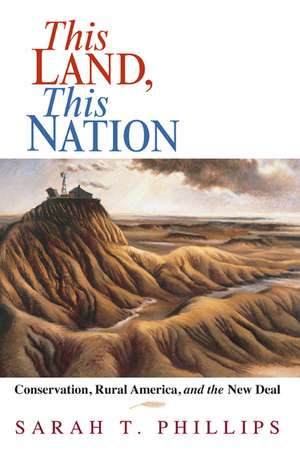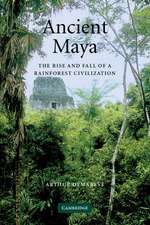This Land, This Nation: Conservation, Rural America, and the New Deal
Autor Sarah T. Phillipsen Limba Engleză Paperback – 11 mar 2007
| Toate formatele și edițiile | Preț | Express |
|---|---|---|
| Paperback (1) | 197.51 lei 22-36 zile | |
| Cambridge University Press – 11 mar 2007 | 197.51 lei 22-36 zile | |
| Hardback (1) | 448.16 lei 43-57 zile | |
| Cambridge University Press – 4 mar 2007 | 448.16 lei 43-57 zile |
Preț: 197.51 lei
Nou
Puncte Express: 296
Preț estimativ în valută:
37.79€ • 39.57$ • 31.27£
37.79€ • 39.57$ • 31.27£
Carte disponibilă
Livrare economică 17-31 martie
Preluare comenzi: 021 569.72.76
Specificații
ISBN-13: 9780521617963
ISBN-10: 0521617960
Pagini: 310
Ilustrații: 1
Dimensiuni: 152 x 229 x 18 mm
Greutate: 0.42 kg
Editura: Cambridge University Press
Colecția Cambridge University Press
Locul publicării:New York, United States
ISBN-10: 0521617960
Pagini: 310
Ilustrații: 1
Dimensiuni: 152 x 229 x 18 mm
Greutate: 0.42 kg
Editura: Cambridge University Press
Colecția Cambridge University Press
Locul publicării:New York, United States
Cuprins
1. The new conservation; 2. Poor people, poor land; 3. The best new dealer from Texas; 4. The industrial transition; 5. Epilogue: exporting the New Deal.
Recenzii
"Sarah Phillips has provided easily the best environmental history of the New Deal that we have. Her wide-ranging and authoritative account of all aspects of New Deal conservation policy firmly places those policies in the context of the New Dealers' hard-headed attempts to tackle the problem of rural poverty. She brilliantly describes the consequences and tensions inherent in their efforts to keep farmers on the land and their ultimate acceptance of an urban, industrial, solution to the problems of the nation's poorest farmers."
-A.J. Badger, University of Cambridge
"Phillips connects the dots between two well-known narratives: Progressive Era conservation and Great Society environmentalism. In doing so she not only makes a significant contribution to our understanding of environmental history, she also integrates an environmental perspective into the larger story of twentieth-century American political development."
-Brian Balogh, University of Virginia
"This Land, This Nation offers one of the boldest and most original reinterpretations of the New Deal in recent decades. By placing conservation and natural resources at the center of New Deal policy concerns, Phillips forces us to rethink not only the 1930s but also American liberalism more generally. A compelling combination of political and environmental history, This Land, This Nation marks the impressive debut of a major new voice on the scholarly scene."
-Peter A. Coclanis, UNC-Chapel Hill
"This Land, This Nation by Sarah Phillips is an outstanding contribution to the study of U.S. conservation and agricultural policies in the first half of the twentieth century. Phillips explains how new ideas about conservation were central to New Deal rural rehabilitation and resource development programs and to what became New Deal liberalism. In addition to discussing the larger New Deal, she neatly explores her major themes by examining the career of Lyndon Johnson and the New Deal in Texas. She also adds a rich perspective to what became of the New Deal after the 1930s by exploring the international development programs of the 1940s. This is a clearly argued, well-written, and well-researched book with much to tell scholars about the evolution of conservation and development from the 1920s to the postwar era."
-David E. Hamilton, University of Kentucky
"A superb study of the unintended consequences of New Deal conservation policy that aimed to renew rural life but which enlarged the federal government and redirected land use, often forcing farm families from the land. Exhaustively researched, gracefully written, and cogently argued, Phillips' book provides an astute, sophisticated analysis of New Deal conservation policy that ultimately aided industry and large-scale agriculturalists more than small-scale farmers. Phillips has written a book that makes a difference, and it will alter the way we think about New Deal conservation policy, particularly regarding the dichotomy between preservation and modernization."
-R. Douglas Hurt, Purdue University
"This lively and intelligent work brings an entirely new synthesis to bear on New Deal liberalism. Blending new political history with environmental history, Phillips demonstrates that equitable resource allocation and management was at the heart of the reconstruction of the American economy in the 1930s. Moreover, she demonstrates that by exporting these structures and ideals in the Cold War, American foreign policy exported the New Deal's approach to rural poverty--for better and for worse."
-Catherine M. Stock, Connecticut College
"During the 1930s, conservationists looked beyond the public lands and their resources to recognize rural poverty as the nation's most destructive and vexing environmental problem. The New Conservation that they proffered in response, Sarah Phillips demonstrates in this masterful study, reshaped the rural landscape and the liberal state in equal measure. This Land, This Nation is not only a major reinterpretation of the New Deal project; is also a critical intervention in the historiography of American environmental politics."
-Paul S. Sutter, University of Georgia
"By bringing together political and environmental history into a fascinating book, Sarah Phillips skillfully uncovers the origins of America's commitment to conservation and the rehabilitation of rural economies. While explaining how New Dealers put forth a new conception of a federal obligation to conservation policy that would last over decades and become accepted by both parties, Professor Phillips offers a fresh interpretation of 1930s America."
-Julian Zelizer, Boston University, Author of On Capitol Hill and Taxing America
"Combining environmental and political history, Phillips offers the first book in decades to paint a sympathetic, comprehensive portrait of agrarian liberals in the New Deal. They implemented highly innovative but ultimately unsuccessful resource policies on rural poverty, land use planning, and the family farm. Other of their programs survived (soil conservation, rural electrification, energy and water development) and fed into our postwar industrial liberalism. Phillips explains this fascinating "rise and fall" story in quick-paced prose that conveys the excitement of the era. Finally, she reveals the little-known history of agrarian New Dealers abroad--workers in international development after World War II."
-Jess Gilbert, University of Wisconsin at Madison
"A dynamic and interesting look at the New Deal conservationism. Finishing it, the reader is left with a clear understanding of the environment and political consequences of the New Deal agricultural policy, as well as a sense of the potential and limits of mid-century liberalism."
-Jon Fox, EH.NET
"Superb synthesis of political and environmental history..."
-Vivien A. Schmidt, Political Science Quarterly
"Phillips has produced a superb study. This Land, This Nation will become a pivotal reference point for new scholarship on twentieth-century agricultural, rural, and conservation history."
-Lynne Heasley, Western Michigan University, The Journal of American History
"Simply stated, this is an excellent book. Other scholars have covered much of the material related to the New Deal, but this author organizes the material in new ways and provides a superb synthesis of the conservation movement from the Progressive Era to the Cold War. This book's exhaustive footnotes demonstrate the depth and quality of her research. Her writing style is clear and insightful and her conclusions are carefully reasoned....an outstanding work of scholarship."
-Michael W. Schuyler, The Annals of Iowa
"This ambitious, well-researched study engages many of the questions that have driven recent histories of the 1930s. It convincingly traces the connections between the idealism of the New Deal and postwar developments that often seem detached from the ideas embraced by President Franklin D. Roosevelt and his cohort of agrarian planners." -Sara M. Gregg, Journal of Interdisciplinary History
"In this sophisticated reinterpretation, Sarah T. Phillips traces the history and impact of New Deal conservation policy." -Brian Q. Cannon, Great Plains Quarterly
-A.J. Badger, University of Cambridge
"Phillips connects the dots between two well-known narratives: Progressive Era conservation and Great Society environmentalism. In doing so she not only makes a significant contribution to our understanding of environmental history, she also integrates an environmental perspective into the larger story of twentieth-century American political development."
-Brian Balogh, University of Virginia
"This Land, This Nation offers one of the boldest and most original reinterpretations of the New Deal in recent decades. By placing conservation and natural resources at the center of New Deal policy concerns, Phillips forces us to rethink not only the 1930s but also American liberalism more generally. A compelling combination of political and environmental history, This Land, This Nation marks the impressive debut of a major new voice on the scholarly scene."
-Peter A. Coclanis, UNC-Chapel Hill
"This Land, This Nation by Sarah Phillips is an outstanding contribution to the study of U.S. conservation and agricultural policies in the first half of the twentieth century. Phillips explains how new ideas about conservation were central to New Deal rural rehabilitation and resource development programs and to what became New Deal liberalism. In addition to discussing the larger New Deal, she neatly explores her major themes by examining the career of Lyndon Johnson and the New Deal in Texas. She also adds a rich perspective to what became of the New Deal after the 1930s by exploring the international development programs of the 1940s. This is a clearly argued, well-written, and well-researched book with much to tell scholars about the evolution of conservation and development from the 1920s to the postwar era."
-David E. Hamilton, University of Kentucky
"A superb study of the unintended consequences of New Deal conservation policy that aimed to renew rural life but which enlarged the federal government and redirected land use, often forcing farm families from the land. Exhaustively researched, gracefully written, and cogently argued, Phillips' book provides an astute, sophisticated analysis of New Deal conservation policy that ultimately aided industry and large-scale agriculturalists more than small-scale farmers. Phillips has written a book that makes a difference, and it will alter the way we think about New Deal conservation policy, particularly regarding the dichotomy between preservation and modernization."
-R. Douglas Hurt, Purdue University
"This lively and intelligent work brings an entirely new synthesis to bear on New Deal liberalism. Blending new political history with environmental history, Phillips demonstrates that equitable resource allocation and management was at the heart of the reconstruction of the American economy in the 1930s. Moreover, she demonstrates that by exporting these structures and ideals in the Cold War, American foreign policy exported the New Deal's approach to rural poverty--for better and for worse."
-Catherine M. Stock, Connecticut College
"During the 1930s, conservationists looked beyond the public lands and their resources to recognize rural poverty as the nation's most destructive and vexing environmental problem. The New Conservation that they proffered in response, Sarah Phillips demonstrates in this masterful study, reshaped the rural landscape and the liberal state in equal measure. This Land, This Nation is not only a major reinterpretation of the New Deal project; is also a critical intervention in the historiography of American environmental politics."
-Paul S. Sutter, University of Georgia
"By bringing together political and environmental history into a fascinating book, Sarah Phillips skillfully uncovers the origins of America's commitment to conservation and the rehabilitation of rural economies. While explaining how New Dealers put forth a new conception of a federal obligation to conservation policy that would last over decades and become accepted by both parties, Professor Phillips offers a fresh interpretation of 1930s America."
-Julian Zelizer, Boston University, Author of On Capitol Hill and Taxing America
"Combining environmental and political history, Phillips offers the first book in decades to paint a sympathetic, comprehensive portrait of agrarian liberals in the New Deal. They implemented highly innovative but ultimately unsuccessful resource policies on rural poverty, land use planning, and the family farm. Other of their programs survived (soil conservation, rural electrification, energy and water development) and fed into our postwar industrial liberalism. Phillips explains this fascinating "rise and fall" story in quick-paced prose that conveys the excitement of the era. Finally, she reveals the little-known history of agrarian New Dealers abroad--workers in international development after World War II."
-Jess Gilbert, University of Wisconsin at Madison
"A dynamic and interesting look at the New Deal conservationism. Finishing it, the reader is left with a clear understanding of the environment and political consequences of the New Deal agricultural policy, as well as a sense of the potential and limits of mid-century liberalism."
-Jon Fox, EH.NET
"Superb synthesis of political and environmental history..."
-Vivien A. Schmidt, Political Science Quarterly
"Phillips has produced a superb study. This Land, This Nation will become a pivotal reference point for new scholarship on twentieth-century agricultural, rural, and conservation history."
-Lynne Heasley, Western Michigan University, The Journal of American History
"Simply stated, this is an excellent book. Other scholars have covered much of the material related to the New Deal, but this author organizes the material in new ways and provides a superb synthesis of the conservation movement from the Progressive Era to the Cold War. This book's exhaustive footnotes demonstrate the depth and quality of her research. Her writing style is clear and insightful and her conclusions are carefully reasoned....an outstanding work of scholarship."
-Michael W. Schuyler, The Annals of Iowa
"This ambitious, well-researched study engages many of the questions that have driven recent histories of the 1930s. It convincingly traces the connections between the idealism of the New Deal and postwar developments that often seem detached from the ideas embraced by President Franklin D. Roosevelt and his cohort of agrarian planners." -Sara M. Gregg, Journal of Interdisciplinary History
"In this sophisticated reinterpretation, Sarah T. Phillips traces the history and impact of New Deal conservation policy." -Brian Q. Cannon, Great Plains Quarterly
Notă biografică
Descriere
This 2007 book presents conservation policy as a critical arm of New Deal reform.










